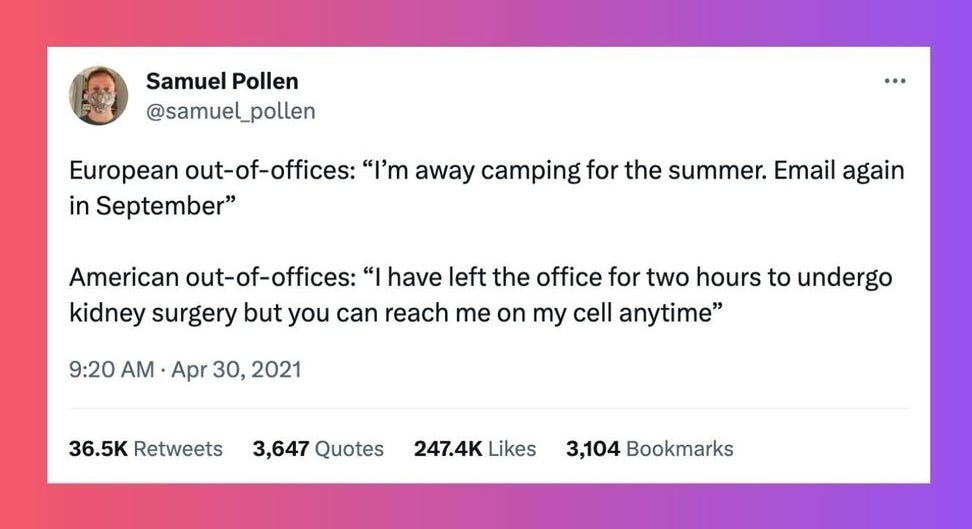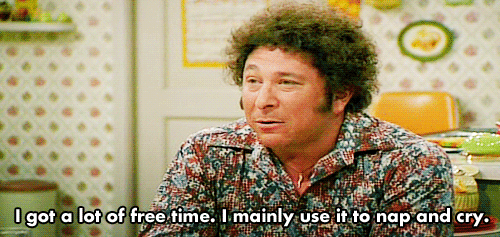#115. Is Europe a solution, or a fantasy?
Americans just wanna breathe that sweet, sexy, burnout-free air
Sometimes I wonder if I would have had children if I grew up in Europe.
I’ve never felt a biological drive to have children, but my own mother didn’t, either. I spent 30 years genuinely thinking I would jump off that particular diving board until I ended my first engagement in 2019, then did a total 180˚ on having kids. I made my decision for a panoply of reasons, but one of them was not wanting to be a mother in America. I respect whatever other people want to do with their lives, truly, but parenting in a work-obsessed country with an “every person for themselves” mentality where pretty much anyone can get their hands on a gun holds almost zero appeal to me.
Does Europe have the answer? Or has parenting become more difficult no matter where you live?
“Selling The Euro-Mom Fantasy” by Miranda Rake for The Cut found its way to me last week and I haven’t been able to stop thinking about it since. It’s a story of two female entrepreneurs who started a business, Mother Euro, to help rich American moms relocate their families to Europe for a higher quality of life. The exact opposite of what we usually think about when “immigration” and “America” show up in the same sentence.
The day after I read this piece – three times, over and over – I spoke to a friend in her early 40s who doesn’t have children. She said she cried listening to “America The Beautiful” at a baseball game the other day because she was so embarrassed and enraged about how awful being American feels right now; I told her I have never been happier with my decision not to have kids after losing my job. Can you imagine? I said. How much more anxious I would be right now if I was financially responsible for someone else?
After our call, my mind started spinning about the intersection of living in the American hellscape with my decision not to have kids. My husband came home and found me typing furiously on my laptop in bed. It was Memorial Day – one of the few days a year most Americans are supposed to have “off” – but we’d both been working since nine that morning. You have a good life, he said. I’d kill to be able to work from bed. I stared at him, one eyebrow raised. I just lost my job, I replied. I don’t think you actually want to trade places with me.
He didn’t say he’d kill to spend time working on one of his passions, like I am; he didn’t say he’d kill to work less. He said he’d kill to be able to do the same amount of work from a supine position. At home. To him, it looked like rest.
We both suffer from the same American disease – productivity, money, hustle, drive.
A friend of mine was laid off in 2020 (another year where available jobs were not at all plentiful.) She told me it took her almost a year to find suitable employment. When she wasn’t applying for new positions, she was mostly laying on her couch, reading books and watching TV. Resting. Relaxing. A few weeks ago, she asked me if I’d watched anything good lately.
No, I replied, because it hadn’t even occurred to me that losing my job could be a time to rest. If anything, I started working more. The hustle never stops. I’m more values-aligned now than I’ve ever been with my work, which means I like it more, so I do it more. I’m chasing paid subscribers now instead of customers. I still keep a regular 9-5 schedule, including at least one full day on the weekends. When I go out for lunch or run errands in the middle of the day, I compensate for the lost time in the evening. I never take a day off.
This is what it means to be an American.
The Cut article made it sound like Europe is a fantasy world for overworked adults where lives and lunches are long and slow and mothers with good outfits gather next to the Mediterranean at candlelit tables every evening to drink wine. To a burnt out, pissed off American living with the Trump administration, maybe this feels like a fairy tale. But is it really? And if European parents are truly happier, why aren’t they having more kids than Americans are?
Take Italy, for example. In Kirsten Powers’ viral 2023 essay, “The way we live in the United States is not normal,” she explains why she and her husband decided to move to Italy for a slower pace of life:
I realized there are other places in the world (not just Italy) where life isn't about conspicuous consumption and "crushing" and "killing" your life goals, where people aren't drowning in debt just to pay for basic life necessities. There are places where people have free time and where that free time is used to do things they love — not to start a side hustle.
This piece is a must-read if you’re growing weary of America’s bullshit. It’s extremely pro-moving to Europe for a better life, which is exactly what Kirsten Powers did. (Don’t think I brushed over the fact that she doesn’t have children, even if she doesn’t belabor the point.)
Or what about Spain, which is featured heavily in the Cut article:
In one video, [Emily San José] chronicles how her family contentedly sits through a five-hour lunch that wraps after 7 p.m. In another, her children stay up until 1 a.m. watching Spanish dancing at a bar — a weekend norm, she says. There’s a quick girls’ trip to Sicily, a walk to school down a charming cobblestone street, and a series of posts from a month spent living at the beach.
But if life is actually better in Europe – and it very well may be – how do you explain the fertility rate? In the United States, it’s currently 1.6 births per woman. But in Italy, it’s 1.2, and in Spain, it’s 1.1. Is parenting getting harder (and less appealing, for some) no matter where you are?
The author of the Cut piece (who is pursuing paths to citizenship in both Canada (1.3) and Italy) wondered about this, too:
Now, months later, having listened to a dozen or so stories of complicated moves abroad, another nagging worry has emerged: What if life with kids isn’t easier elsewhere? Without my realizing it, a different echo chamber — the one on my phone full of outdoor cafés serving cured meats that kids gobble down with gusto and leisurely afternoons full of shopping and aperitifs — might have mildly warped my understanding of that, too.
Many roads lead back to Ezra Klein, in particular his podcast episode: “The Deep Conflict Between Our Work and Parenting Ideals” with sociology professor Caitlyn Collins. Seriously, this is a must-listen if you find this topic interesting. It’s one of the most fascinating podcasts I’ve ever listened to.
Hearing about the wildly generous public policies for working parents in Sweden almost made me laugh. In another life, maybe that’s where I would have been considering parenting, if my great-grandparents hadn’t emigrated to America. (Paul’s great-grandparents are from nearby Norway, too.) 480 days of paid parental leave. A legal right to reduce your working hours to 30 hours per week for the first eight years of your child’s life. Roughly $175 per month (or less) for full-time childcare. Sweden’s policies are extremely friendly to working parents of both genders, and yet, their fertility rate is virtually identical to ours. And still well below the replacement rate, even with policies that make Scandinavia seem like a utopia where happiness and work/life balance grow on trees, at least through the lens of a stressed-out American whose entire existence feels like burnt toast.
The crux of the episode is this: Modern culture says we can either be the “Ideal Worker” or the “Ideal Parent,” and these two ideologies are almost always at odds with each other. We’ve been trained to have ultra-high standards for ourselves, and we aim to parent perfectly, or maybe not at all.
Ezra Klein: “To have a culture that is so built around professional identity, and then also prizes intensive parenting, I just wonder if that is actually a tension you can resolve.”
Caitlyn Collins: “To me it gets back to this cultural idea of what it means to be a good parent. Intensive parenting requires that it is incredible emotionally absorbing, it tends to be quite expensive, it should be time consuming, and it should be child-centered.”
This is another idea that fascinates me about American parenting (maybe elsewhere, too.) Adults constantly immersing themselves in spaces meant for children, instead of the other way around. Respectfully, that shit is just not for me.
Sweden isn’t as obsessed with work as the U.S. is, and they’ve put policies in place to make parenting-while-working easier than it is in America. (I think we can say with a reasonably high degree of confidence that it is.) So why hasn’t that translated into Swedish women choosing to have more kids than Americans?
According to Caitlyn Collins, Stockholm is littered with child-friendly spaces, like parks and playgrounds, designed to create and foster community. But is it also designed to be a child’s utopia, instead of an adult’s?
Ezra Klein: “This feels like it also bears on the question why a lot of pro-family policy does not have an impact on birthrates. If I think back to the Swedish policies we were talking about earlier, the idea of taking eight months off for each kid? I shudder. To just sit there staring over an infant? I love my children, and that’s a lot of time. That is a policy built around intensive parenting.
I don’t know what the policy structure would be to encourage “eh” parenting [laughs], but if you wanted to conceptualize the fertility rate as a problem, it’s the idea that we have just made parenting too hard and intensive. Most of the policies that I can think of are operating within the structure of, you should be able to spend more time with your children. More and more and more time. The issue here that I think is harder to resolve is: What does it look like from a policy or cultural perspective that we like children, and we think children are great, and that it’s not supposed to be a whole other job?”
Something we haven’t been able to solve for yet is the fixed nature of time. There will always be 24 hours in a day, unless we move to a different planet (you know, could happen some day?) So if we’re still living under capitalism, let’s say working 40 hours per week, that means 5 out of 7 days we’re spending roughly 8 hours working and 8 hours sleeping (or trying.) That leaves 8 hours a day for everything else, including parenting. The more parenting consumes that nebulous 8 hour block, the less time we have for our friends and relationships and passions and alone time. If we had 8 dedicated hours a day just to devote to “adult stuff,” whatever that means for you, maybe we’d feel a little less like having kids means giving something up. But there’s only 24 hours in a day, and something has to give. Maybe some of this is really just a math problem.
Both Caitlyn and Ezra jokingly said that their ultimate solution to a better parenting situation isn’t long lunches, more time at the playground, or late nights out watching Spanish dancing with their children at a bar. It’s a co-parenting commune where groups of close friends could share the burden of raising kids. They didn’t say this directly, but read between the lines and I think they’re implying they want more time doing “adult stuff” with their friends, and less time doing “kid stuff.” Maybe permission to lean a little into “imperfect parenting” and increase the amount of time spent in adult spaces away from kids and work.
You know. Like, free time.
If you’d presented me with an option of “eh” parenting when I was on the fence, I’m still not sure I would have taken it, though. I think a lot about whether parenting / having kids is an inherently selfish or selfless act, and I think it’s simultaneously neither and both. Knowingly parenting sub-optimally, though? I guess that feels more selfish to me than not having children at all, even if we’re saying that’s probably what is most practical?
But maybe I feel that way because of the culture I was raised in. Success. Achievement. Optimization. Burn out. Maybe any culture that encourages intensive/perfect parenting and deprioritizes free time really is to blame here, if we’re looking for a reason the fertility rate is dropping globally.
Maybe growing up in Europe wouldn’t have changed anything for me at all.
“The only thing we have to change is everything,” Ezra said. I think I have to agree.
He was careful to clarify that he respects individual choice, but at the very end of the podcast, Ezra asked Caitlyn whether it “makes her wonder” about a society that doesn’t value children because they make life more difficult for adults. She said:
Caitlyn Collins: “As a sociologist, as a feminist, I don’t really care about our total fertility rate as a policy target. If you asked me, I would tell you we should open up our borders and let immigration solve our “fertility problem.” I don’t think we should try to be using policy as a lever to encourage more births. What I do care deeply about is creating a society in which adults can make choices for themselves that bring them joy. Meaning. Fulfillment. Happiness. A sense of wholeness. That’s what matters to me.”
In that sense, I’m exactly where I’m supposed to be.
Kirsten Powers said it best:
Everyone is on their own journey and should make the decisions that are best for them and their families. People with major megaphones should be more careful about demonizing people who have made different calculations and decisions than they have and resist the reflexive urge to believe there is only one way to behave in a crisis.
In a time when judgment seems to overrule curiosity, we should try to avoid the impulse to turn on each other for a difference of opinion or life choice. The nuanced analysis will bring us closer to real solutions; binary all-or-nothing thinking will just divide us.
Paul and I may eventually run off to Europe someday seeking a slower life with endless plates of pasta and French wine, but I know it won’t be because we’ve decided to have kids. Culture never changes that quickly, and our minds are already made up. But for anyone who really wants to, I hope they do. And I hope that eventually Americans won’t have to fantasize about moving to Europe to do it.
Well! That’s all I have for you this week – the three articles and podcast issues I linked in bold above are absolutely bangin’ and the last book I read was bad, lol.
Before I go, though, my Stortyime™ inbox is on E. The first three people who submit a story or question (anonymously!) starting now through this weekend will be handsomely rewarded with a free 6 month comped subscription if you want to get into the Sheila Heti Summer Slow Read. Your submission will be anonymous, just leave me your email address that you use to subscribe in the form so I can comp you. (Don’t forget because I have no way of knowing who submitted what otherwise!) TYSM!!
This Sunday, my friend Megan is joining me to chat about something I think is extremely relatable, which is the timing behind deciding to have kids. Issue #6 is called “As soon as things are good,” and Megan and I get into how our lives have had incredibly weird parallels from the ages of 12 to now, except for one major thing: Parenthood. We talk about the “pie chart” of your time (which is very apropos for today’s essay!) and being able to feel opposing emotions at once a la last week’s issue about Jennifer Lawrence.
(Also, last week’s podcast is definitely one you shouldn’t miss about the tension between writing and being a parent! We also talked about the pie chart of being a person, completely separately and unrelated, so I feel like that’s a topic to dive into for another issue…)
Have you ever considered running off to Europe? For any reason? Come tell me in the comments.














"Europe" doesn't mean anything. Europe is not a country. I'm from France, and the situation here (albeit acceptable) is really not the same as the situation in Nordic countries like Sweden, Iceland or Norway. But I get your point, and the fact that maternity leave still doesn't exist in the US baffles me. Also, everything is crazily expensive (paying 1500 dollars a month for daycare ? No thanks) !
In the end, I think people make way less babies because they just... don't want to. The money part is important, but not as much as we think it is. If you truly want to have a child, you will. Personnally, I leave in a country where it's relatively easy (compared to the US) to have a family. But I'm still on the fence, and it's largely in part because of the patriarchy. I don't want to lose my freedom. I don't want to become a domestic slave, like my mother was. I don't want to make sacrifices, because I only have one life. And I bet I'm not the only 30-something who think in these terms.
Honestly, the thing is : if I was a man, I probably would want to have one child. That's another way of answering the question.
Swede here. I find it so hilarious that he thought parental leave was boring because all you do i stare at an infant? For 8 months (which would be the time each parent take here if the follow the recommended procedure however a lot of dads still only take the mandatory 3 months). And he actually has kids? Has he MET THEM?
anyhoo USA baffles me daily. It all seems insane. Parents here are tired and burnt out and all that even with childcare and free schools and reduced working hours (if you can afford the pay cut…). It’s still exhausting to have very little adult time. But I do think it’s to a different degree, if you look at population level.
Do come to Sweden, you would like it!